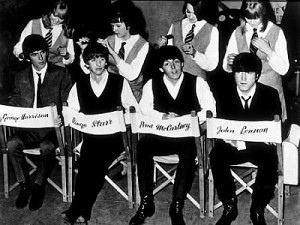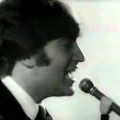- You know my name - September 11, 2010
- Everybody’s trying to be my baby - September 9, 2009
- Nothing to get hung about? - August 13, 2009
 MOLLIE WILSON REILLY • Hi folks! Consider this a public service announcement. Showing tomorrow, throughout the day, on the Independent Film Channel, for reasons unknown to me: A Hard Day’s Night, probably the best movie ever made in a rush with the express intention of cashing in on a fad. I know my fellow Dullbloggers need no introduction to this movie, and probably don’t need to watch it on television, either. At this point I suspect we can all just cue it up in our heads. But I post this (and cross-post it over at Restricted View) for all those who do not share our obsession, because you needn’t be a Beatlemaniac to enjoy this movie — a love of film will do it, or an interest in the 1960s, or just a fondness for British humor (and accents). Love social satire? A Hard Day’s Night is your movie. Prefer loud music and people making funny faces? This movie has you covered.
MOLLIE WILSON REILLY • Hi folks! Consider this a public service announcement. Showing tomorrow, throughout the day, on the Independent Film Channel, for reasons unknown to me: A Hard Day’s Night, probably the best movie ever made in a rush with the express intention of cashing in on a fad. I know my fellow Dullbloggers need no introduction to this movie, and probably don’t need to watch it on television, either. At this point I suspect we can all just cue it up in our heads. But I post this (and cross-post it over at Restricted View) for all those who do not share our obsession, because you needn’t be a Beatlemaniac to enjoy this movie — a love of film will do it, or an interest in the 1960s, or just a fondness for British humor (and accents). Love social satire? A Hard Day’s Night is your movie. Prefer loud music and people making funny faces? This movie has you covered.
A Hard Day’s Night was filmed in six short weeks on a tight budget — an attempt to profit from Beatlemania while it was still raging, without keeping the boys from touring and recording for too long. It could easily have been sloppy, brainless, pandering — the cinematic equivalent of the phony “autographed” pictures Paul’s fictional grandfather hawks outside the TV studio at the end of the film. A lousy Beatles movie would still have made money; the teenagers would have come to scream regardless of the quality. It didn’t need to be creative or artistic. But behind their popularity, the Beatles set high artistic standards: they wanted every song on their albums to be good, not just a couple. A Hard Day’s Night is the product of the same approach, this time from director Richard Lester and screenwriter Alun Owen: Why not make it great? And the film they put together turned out so well that those screaming teenagers were ultimately regarded as a nuisance by moviegoers who actually wanted to hear the dialogue.
For those who haven’t had the pleasure of seeing it: A Hard Day’s Night is styled as a pseudo-documentary (not to be confused with a “mockumentary” — although This Is Spinal Tap owes much to the Beatles in general and to this movie in particular), with the four Beatles playing themselves, or rather stylized versions of themselves. You can’t help but be impressed by Gilbert Taylor’s moody black-and white cinematography, and the musical sequences are so artfully shot that you can overlook the clash between the poorly integrated sound (and obvious lip-synching) and the documentary feel of the dialogue scenes. And even if you are intimidated at first by the impenetrable Scouse accents, that (Oscar-nominated!) dialogue is well worth hearing, I assure you. It’s a thrilling mix of satire and absurdity; certain scenes, like the opening sequence in the train car, play like Marx Brothers routines without the disorienting breaks for laughter. Your favorite Beatle (whoever he might be) has plenty of highlights throughout; I’m a George girl, so I’m convinced that he has all the best lines — and the best delivery, given his command of what one character describes as “all that adenoidal glottal-stop and carry-on.” I can’t get enough of the scene where he wanders into the television producer’s office. It’s so shatteringly smart you wonder how programming and marketing for teens can remain so terrible, and so unrepentant, in its wake.
Don’t get IFC? I still think you should drop everything and see this movie. In fact, you might enjoy it more on DVD, in its digitally remastered state, now available from Amazon.com for… $6.99?! (I think it’s time for me to replace my VHS copy.)
In spite of having most of AHDN committed to memory, I seldom pass up a chance to rewatch it, and I find that, between viewings, I tend to forget just how good it is. A favorite college professor of mine screened it, attendance optional, for a course in postwar British literature. A few years back I went to a screening at Lincoln Center, which was followed by a discussion with many interesting panelists (although nobody said anything I found very memorable, and I confess to being most excited about seeing Louise Harrison, George’s sister, in the flesh). When I spent a semester in England, I joined a walking tour with a group of other Beatles dorks, led by a guide who took us to Marylebone Station and showed us where Paul sat with his mustache and his “grandfather,” and where George face-planted on the sidewalk outside. It was thrilling. What are your favorite AHDN moments? Does it loom large in your legend, too?



Great post Mollie! I have so many favorite parts. I love Lennon’s “snorting Coke”; when one of them falls down during the opening credits; George drawing a moustache and glasses on the monitor…
I always try to catch A Hard Day’s Night on the big screen with an audience. The last time was this past August, as the front half of a double-bill. Get this: AHDN, followed by a Q and A with Victor Spinetti, then “How I Won the War.” (I hadn’t labored through that one since Beatlefest ’85!)
That screening is responsible for joggling loose the Beatles novel I have making the rounds in New York (if you see the manuscript, say hi). When I walked in, I had the same idea I’d struggled with for over a year; by the last chord of “She Loves You,” I had my book. Whether this is a good thing or not remains to be seen, but for now let’s assume that it’s good.
Two things broke me through. The first was the composition of the audience: there were Baby Boomers, families, and teenagers with their friends in approximately equal proportions. A piece of pop culture–of music–that bridges like that is almost unheard of. What does AHDN make a ten-year-old or a fifteen-year-old feel? Is the same thing that I feel at thirty-eight, or my aunt feels at fifty-four? There may have been hype behind the Beatles in 1964, but whatever speaks to people now must be durable, authentic, human.
The joyous fact is that the Beatles are not dying out; they are not receding into history. They continue to attract fans now, and will continue to attract fans. They have escaped their original context, because what they are is strong enough to create its own context. No one back in 1964–least of all the Beatles themselves–ever imagined this.
This is why I was so dismissive of Mimi Smartypants’ lionization of Van Halen in your post last week. No offense to Van Halen, but they’re just a freakin’ rock group. What’s happened since 1970 proves that The Beatles are the outward manifestation of something much larger, and more permanent, than John, Paul, George and Ringo. And maybe even better than they were, too. John Lennon couldn’t be more wrong when he says that “The Beatles were just a band that made it really big,” and if he had lived, I think he would’ve realized that.
Then, of course, was the movie itself, which still thrills me. That concert at the end…wow. I don’t know how they did it, but to me AHDN feels weirdly authentic, as authentic as any documentary, only more satisfying because it has shape and structure. The Beatles may be universal, but Beatlemania was a distinct time and place, and somehow AHDN chipped off a bit of all that optimism, unity, and joy–a mass celebration unique in modern history as far as I can tell–and preserved it in celluloid for future generations to enjoy.
I’ve watched the rest of Richard Lester’s work, and nothing else comes close. I’ve seen HELP! many times, but it too has something missing. Like The Beatles themselves, AHDN is an example of the right people coming together at the right time to do something wonderful–and whenever that happens, it’s precious, like the birth of a person destined to do good.
The Beatles were fantastically talented, and hard workers too, but what AHDN shows is just how lucky they were, how the world seemed to be conspiring to give us all a treat. Perhaps the magic of AHDN is that the four of them were still having fun in a world of limitless possibilities, still amazed at their good fortune and excited to see what would happen next. On the other hand, maybe it was the speed. All I know is, every time I watch it, I feel the same way.
Googling around led me to this Slate piece on AHDN by David Edelstein. His analysis of the film is most astute, and he compares it to Lester’s other work, which might interest you, Mike.
Very jealous of your Victor Spinetti Q&A experience! He ensures that AHDN, Help! and Magical Mystery Tour have at least one thing in common…
George Girl!
Lovely post, and nice comment, Mike.
I’m eager to catch AHDN again soon—somewhat perversely, to see a young Phil Collins in the studio audience. (I never knew about this until Devin told me about it last summer.)
Wondering: Any other notables-to-be in those crowd scenes?
Three things:
1) Did you know that Gilbert Taylor shot A Hard Day’s Night immediately after lensing another contemporary classic — Stanley Kubrick’s Dr. Strangelove?
2) Michael says, “The joyous fact is that the Beatles are not dying out; they are not receding into history. They continue to attract fans now, and will continue to attract fans.”
This is why I was confused to read Allan Kozinn’s story in the NY Times a few years back, I believe when the “Anthology” book came out. He ended the story with an odd scene in a student bookstore near Columbia University, where not one but two (presumably college-age) store employees didn’t know where the Beatle books were shelved because they had never heard of the Beatles. Mr. Kozinn chose, for some reason, to end his story on this note, leaving the clear implication that the Beatles were “on the wane” (familiar words), and that, sad but true, they were doomed to fade with the coming of the millennium and ensuing generations of fans. (Maybe parts got edited out that would have altered this impression.)
I’m not speaking as a fan here, only as someone with eyes and ears open in America at this point in history: To find two people in a college bookstore who have never even heard of the Beatles at this late stage says nothing about the culture, or about history, or about waning and fading, but everything about a level of cultural ignorance that truly beggars belief.
3) For Lester’s other work, I love The Knack. Silly and ephemeral and youth-obsessed, but also damn fresh and joyous, capturing a moment like a butterfly — and all in a peculiarly dirty, overexposed black and white. And Petulia is hard to underrate. Andrew Sarris was right when he said it and AHDN were “the only Lester films that generate warm feeling,” or something to that effect.
I said Petulia is hard to underrate. I meant to overrate. Unless you called it the greatest movie ever made, then it would be easy to overrate.
Devin, that doesn’t surprise me about “Dr. Strangelove” and “AHDN” having the same DP; same crispness. According to IMDB, Gilbert Taylor also did “Ferry Across the Mersey.” Wonder who DP’ed “Having a Wild Weekend”?
Funny you brought up college kids; I meet a lot of ’em, and one of the most reliable bits of common ground is an appreciation of The Beatles. Right, Mollie? 🙂
I haven’t seen “The Knack…” in years, but I recall liking it all right; I’m a sucker for anything Swinging London. I saw “Petulia” last year (maybe the same week as the double-bill) but apart from George C. Scott, I had the same problem with that film that I do with most of Lester’s stuff–I found it strangely gimmicky.
I saw AHDN when it first opened, in a large movie theatre filled with screaming teenaged girls (hard to believe they’re all grandmothers now)… at the time, I took the movie for granted. I loved it, but strangely assumed that it could be no other way, how could the movie not be great. But now, looking back, I realize what a miracle it was.
Look at the Elvis movies, what pieces of absolute garbage they are. Look at poor Roy Orbison’s movie (Fastest Guitar, from 1967), a mediocre technicolor western.
Any other band would have passively left it up to the “experts” to make a movie for them. The Beatles insisted on a “real” writer and director.
Can you imagine the horrible result if the Beatles had left it up to the producers of “The Fastest Guitar” to create a Beatle movie?
I have a VHS tape somewhere of interviews after the Los Angeles premiere of Help! An elderly Groucho Marx is asked what he thinks, and he says he actually enjoyed it very much. Jack Benny appears also, and he says “They made two great films.”
In my youth, I took for granted so much of what the Beatles accomplished (“of course all the tracks on their album are great, of course their movie is great, why wouldn’t it be?”). Years later, looking back, I understand their achievement, how every step along the way they could have easily fallen into mediocrity and self-parody, but it just wasn’t in them to do that.